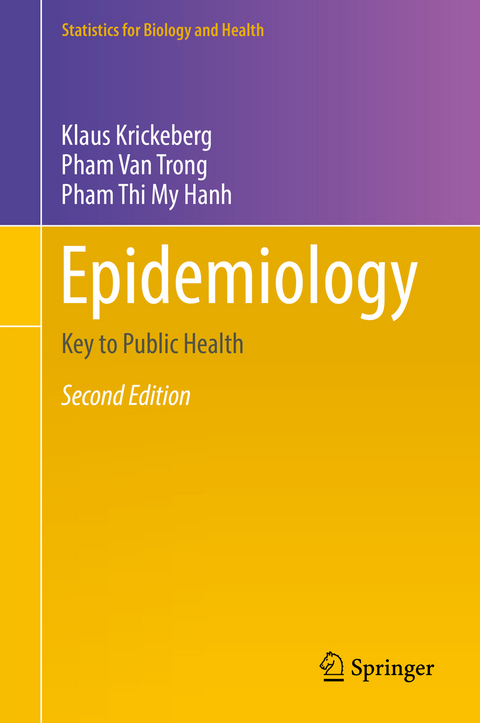
Epidemiology
Springer International Publishing (Verlag)
978-3-030-16367-9 (ISBN)
This unique textbook presents the field of modern epidemiology as a whole; it does not restrict itself to particular aspects. It stresses the fundamental ideas and their role in any situation of epidemiologic practice. Its structure is largely determined by didactic viewpoints.
Epidemiology is the art of defining and investigating the influence of factors on the health of populations. Hence the book starts by sketching the role of epidemiology in public health. It then treats the epidemiology of many particular diseases; mathematical modelling of epidemics and immunity; health information systems; statistical methods and sample surveys; clinical epidemiology including clinical trials; nutritional, environmental, social, and genetic epidemiology; and the habitual tools of epidemiologic studies. The book also reexamines the basic difference between the epidemiology of infectious diseases and that of non-infectious ones.
The organization of the topics by didactic aspects makes the book ideal for teaching. All examples and case studies are situated in a single country, namely Vietnam; this provides a particularly vivid picture of the role of epidemiology in shaping the health of a population. It can easily be adapted to other developing or transitioning countries.
This volume is well suited for courses on epidemiology and public health at the upper undergraduate and graduate levels, while its specific examples make it appropriate for those who teach these fields in developing or emerging countries.
New to this edition, in addition to minor revisions of almost all chapters:
- Updated data about infectious and non-infectious diseases
- An expanded discussion of genetic epidemiology
- A new chapter, based on recent research of the authors, on how to build a coherent system of Public Health by using the insights provided by this volume.
Klaus Krickeberg was a professor at the Université Paris 5 René Descartes from 1974 until his retirement in 1998. His research focuses on dimensional theory, probability theory, stochastic geometry, geometric statistics, epidemiology (especially tropical diseases) and health information systems. In Paris, he began to study Vietnamese history and culture and, starting in 2006, led public health projects in Laos and Vietnam on behalf of a foundation. He has also worked in similar projects for UNICEF, the EU and GTZ in Vietnam and Cambodia. Krickeberg holds a doctorate from the University of Berlin. A former editor of the Journal of Probability and Related Fields, he also served on the council of the International Statistics Institute (ISI) and chaired the ISI Committee on Statistics in Developing Countries.
The idea of epidemiology.- Uses and applications of epidemiology.- Some case studies and situation analyses.- Infectious diseases: descriptive epidemiology, transmissions, surveillance, control.- Infectious diseases: modelling, immunity.- Diarrhoea and cholera.- Tuberculosis and malaria.- Dengue fever.- Viral hepatitis.- HIV/AIDS.- The origin of information: registers and health information systems.- The origin of information: sampling.- Descriptive data analysis and statistics.- The normal law and applications: Sample size, confidence intervals, tests.- Basic concepts of epidemiology.- Cross-sectional studies.- Cohort studies.- Clinical (therapeutic) trials.- Clinical epidemiology.- Case-control studies.- Confounding.- Epidemiology of cancer.- Epidemiology of cardiovascular diseases.- Community studies.- Nutritional and environmental epidemiology.- Social and genetic epidemiology.- Some practical considerations around epidemiologic studies.- What is missing?.- The role of epidemiologyin building coherent systems of public health.
"It is best suited for physicians who will likely not need to perform large epidemiological studies. ... It is most suitable as an introductory book, used in combination with a more in-depth textbook or practical experience." (Allison Dykstra, Doody's Book Reviews, November 22, 2019)
“It is best suited for physicians who will likely not need to perform large epidemiological studies. … It is most suitable as an introductory book, used in combination with a more in-depth textbook or practical experience.” (Allison Dykstra, Doody's Book Reviews, November 22, 2019)
| Erscheinungsdatum | 25.07.2019 |
|---|---|
| Reihe/Serie | Statistics for Biology and Health |
| Zusatzinfo | XVII, 264 p. 5 illus. |
| Verlagsort | Cham |
| Sprache | englisch |
| Maße | 155 x 235 mm |
| Gewicht | 583 g |
| Themenwelt | Mathematik / Informatik ► Mathematik ► Wahrscheinlichkeit / Kombinatorik |
| Studium ► Querschnittsbereiche ► Epidemiologie / Med. Biometrie | |
| Naturwissenschaften ► Biologie | |
| Schlagworte | Biostatistics • Clinical Trials • cohort studies • Community Studies • epidemiology • Health information systems • Public Health |
| ISBN-10 | 3-030-16367-9 / 3030163679 |
| ISBN-13 | 978-3-030-16367-9 / 9783030163679 |
| Zustand | Neuware |
| Haben Sie eine Frage zum Produkt? |
aus dem Bereich


